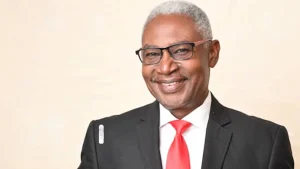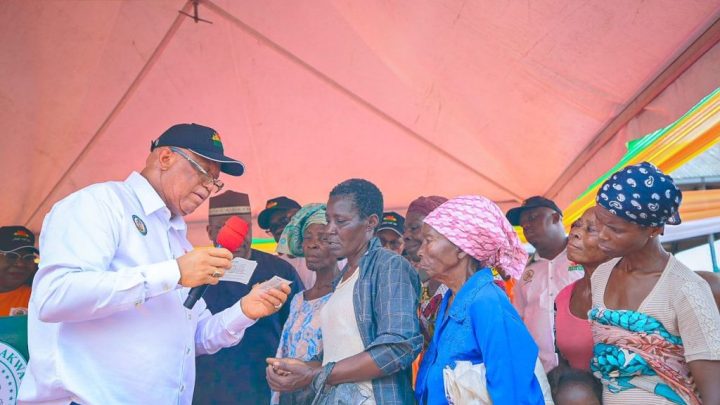Byline: Ibanga Isine and Grace Asamm
Food from the Governor
Theresa Jonathan, 55, from Ibekwe Akpan Nya in Ward One, Mkpat Enin Local Government Area, of Akwa Ibom State is not a stranger to hard work. She has never waited for the proverbial manna to fall from heaven. Daily, she works on her farm, cultivating food crops, which she sells alongside other petty goods at the local market to help support her husband and care for their children.
But during the past 19 months, things have changed and very drastically especially for struggling families all over the country. With the biting hardship, providing even the most basic needs for an average family has become a tough job.
So, when Ma Jonathan heard that the state government, through the Bulk Purchase Agency, was offering food stamps, she didn’t take it seriously.
“Government sharing food stamps? I’ve never seen that happen,” she thought, dismissing it as another political gimmick. But she got the stamp all the same.
Her perception about the food stamp changed on November 19. On that day, the Bulk Purchase Agency’s food truck rolled into the local government secretariat, and hundreds of people gathered, hopeful and eager.
To her surprise, the food distribution was real. For the first time in her life, she could get something home. A little food that would feed her family, even if it is just for a few days. There was no fighting. No one was pushed down. Everyone queued based on their wards and the distribution was seamless.
“May God bless Governor Umo Eno for remembering someone like me. This has never happened. I thought they wanted us to come out so they can count us because of politics but it turned out that they brought food to us,” said Madam Theresa.
You can also read – Untold Stories of Akwa Ibom’s Emerging Entrepreneurs II
Anietie Ekpenyong Okon, 50, is a native of Emana Ikot Ebo in Uruan Local Government Area, within Uyo Senatorial District. Although life hasn’t been kind to her, she has refused to give up. A widow and mother of six, Ma Okon has learned to ride the storms life throws her way, despite her physical challenges.
For many years, she has heard about government palliatives, but they always seemed like a fairytale or something reserved for the well-connected persons and those who are politically exposed.
“I’ve never received anything from the government,” she says, with a mix of exhaustion and resolve in her voice. Despite her bad leg, she managed to get to the council headquarters.
She went out hopeful that perhaps, just perhaps, the narrative could change. Could this be the moment when the government remembers someone like her?
At the council secretariat she told GuardPost Nigeria, “As you can see, I don’t have hands, I don’t have legs. I had a major injury on my hand and can’t do anything. I have 6 children and I am raising them all alone after my husband died and left me to my fate.
“I have just small garden by my house I don’t have a farmland or money to even buy a farmland to plant. I am grateful to God for this gift from the governor and my prayer is that God should give him the enablement to grow from grace to grace to support the vulnerable people like us.”
In Obot Akara Local Government Area, which is in Ikot Ekpene Senatorial District, Chief Emmanuel Akpan from Ikot Abia could not hide his gratitude to the state government for the food support initiative, especially as the cost of basic food items has skyrocketed.

Bulk Purchase Agency shares food to vulnerable persons in Akwa Ibom State
After getting his share, Mr. Akpan told one of our correspondent, “This is the first time I’ve seen the government truly reaching out to the grassroots to support the people,” he said with a heartfelt smile. “I pray that God blesses Governor Umo Eno and consoles him and his family over the loss of his wife. My advice to him is to keep going in this direction because God will stand by him and grant him a second term in office.”
You can also read – Untold Stories of Akwa Ibom’s Emerging Entrepreneurs II
Speaking to the mammoth crowd in Obot Akara, the General Manager of the Bulk Purchase Agency, Unyime Etim, said the governor was touched by the plight of the people and decided to send food to them.
“Idung mamma! Idung mamma!!” he began. “Obot Akara mamma do ooo! Our governor, Pastor Umo Eno, I hope you all know him,” he continued as the crowd thundered, “We know him very well.”
“Yes, Pastor Umo Eno has sent us to bring food for the people of Obot Akara Local Government Area. Since we had already sent you tickets (stamps), the governor has asked that when I come, you should bring the ticket so that you will exchange it for food.
“So, hold your ticket well. Don’t squeeze it. You don’t also have to struggle because the food we have brought is enough to go round,” Mr. Etim advised just as the back of the food truck is opened and the crowd filed orderly to get the neatly packaged food.
Mrs. Jonathan, Mrs. Okon and Chief Akpan are just three of the several thousand persons from the three senatorial districts of the state, who have benefited from the food stamp initiative. Through the Bulk Purchase Agency, the programme has made its way to all 31 local government areas—not once, but twice—during its first and second phases.
How Akwa Ibom food stamp began
Governor Umo Eno was elected after a very caustic campaign that tested not only the quality of his character but also thrashed his credentials. It wasn’t only his opponents who questioned his economic blueprint. The media, civil society, and even self-appointed “economic experts” who could barely balance a petty cashbook joined the fray, questioning his grasp of governance.
He didn’t back down on the promises he made nor spend much time trying to explain what he meant but forged on, encouraged by a wife, Patience, who knew how to turn water into wine, figuratively speaking. Many would say that over the past 18 months, Governor Eno has been performing his own version of turning water into wine. He’s tackled nearly two-decade-old gratuity and promotion arrears for state workers, provided homes for the most vulnerable, and empowered entrepreneurs with resources to build their dreams.
At the same time, he’s paid off billions in debts inherited from previous administrations while laying the groundwork for a future less dependent on oil revenue. He is clearly balancing acts of compassion, fiscal responsibility, and vision in the governance of the state.
When he inaugurated the Bulk Purchase Agency on March 23, the governor didn’t just talk about compassion. He brought it to life, pushing its boundaries far beyond the confines of government rhetoric. With a clear mandate to provide staple food items at no cost to the state’s most vulnerable, the agency became a bold expression of his commitment to those in need.
He, therefore, urged the leadership to collaborate closely with the Ministries of Economic Development and Agriculture, as well as food producers, distributors, and other stakeholders, to ensure the food voucher programme achieved its purpose.
“Don’t hesitate to acquire buffer stock if needed,” he advised the board. For the programme to work, agency must stay ahead of any supply challenges, showing that the initiative wasn’t just about feeding people. It was also about doing so with purpose, precision, and a heart rooted in genuine care for the people of Akwa Ibom.
Between March, when the governor launched the ARISE Food Security, an initiative to offer free food to the vulnerable persons captured in Nigeria’s social register, indigent persons across the state have been given five kilogrammes of staples like rice, beans and garri.
In every local government area of the state, between 4,000 to 5,000 people, regardless of their political, religious, or ethnic affiliations, have received food support. For many, it has been a lifeline that has brought hope to homes that have struggled under the weight of economic hardship.
Remarkably, the distribution process has been smooth and orderly and this contrasts the tragic chaos reported in other places like Oyo, Abuja, and Anambra, where stampedes during palliative sharing claimed lives.
The operators of the initiative in Akwa Ibom, have paid serious attention on the dignity and safety of everyone, ensuring that every family gets their share without fear or harm.
Many have noted that the initiative goes beyond just feeding the people; but has rekindled a sense of community and trust besides demonstrating what can be achieved when thoughtful planning and genuine care take center stage.
A whiff of hunger across Nigeria
For those with stable livelihoods, the current economic hardship may feel like a passing storm. But for countless others, the question isn’t about understanding the rising cost of garri or vegetables like Ikong Ubong, staples that were once abundant and affordable.
The question is, why can’t they eat anymore? No explanation from economists can fill an empty stomach. Hunger is real, and it is everywhere. It is walking on two legs.
Increasingly desperate, many are now hunting through refuse dumps. Unfortunately, they are not searching for scraps or plastic to sell. They are scavenging for rotten food. Yes, they pick rotten food items and cook them for a meal.
A sad example of this came when Nathaniel Bassey, one of Nigeria’s most adored gospel singers, shared how a hungry man scavenged through his trash a few weeks ago, searching for anything edible. He immediately launched a feeding programme and also asked people to share the little they have with those who don’t have – and there are so many who don’t have.
Pastor Nathaniel’s story was really haunting, but for many, it’s an everyday reality. A reality that shows no signs of improving.
People are driven to desperate lengths just to secure a morsel of bread for their families. The situation is even direr in rural communities, where the majority of the country’s population struggles to survive. No part of Nigeria is spared from the grip of hunger and suffering.
Every day on radio and TV, our leaders call for more sacrifices from the poor, all while feasting at endless banquets in their palatial mansions. These are luxuries built and maintained with public funds. It seems the poor must keep sacrificing, perhaps until they’re completely burnt out, like offerings on the altar of some insatiable gods.
To cushion the hydra-headed hunger in the country, the Nigerian government came up with a poorly-conceived and implemented palliative policy. Warehouses are filled with badly needed grains specially packaged to be shared to those in need.
While a few bags of the grains actually got to those who needed them, tons of the food are locked up and left to rot in many warehouses across the country until angry youth found them, broke in and helped themselves.
But the Akwa Ibom State initiative is different in so many ways. As with many innovative government programmes, the Bulk Purchase Agency has faced its share of criticism. Some have been very constructive, others are simply not. Yet, step by step, the vision behind the agency is beginning to take shape.
When CSO, opposition say Umo Eno has done well
While the government’s food distribution initiative through the Bulk Purchase Agency has attracted widespread commendation for its organisation and impact, many are urging the governor to think beyond food handouts and focus on sustainable solutions to tackle hunger.
Harry Udoh, Chairman of the Civil Society National Regulation Council and BOT Chairman of the Akwa Ibom State Civil Society Forum, commended the governor for the orderly execution of the food intervention programme.
“The level of organisation in Akwa Ibom’s food distribution process, especially during the first and second phases, is commendable,” he noted. “Unlike the tragic stampedes seen in other states, Akwa Ibom has avoided such incidents through careful planning and the use of a social register.”
However, Udoh called for a review of the social register used to identify beneficiaries, pointing out that it has been influenced by political appointees and village heads who may compromise its integrity. “We’ve heard that cronies of politicians have been included in the register,” he said. “This process should be independent and scientific. You can’t just rely on village heads to name the poor—they could skew the results.”
While recognising the impact of the food distribution, Udoh emphasised the need for a long-term strategy to ensure food security. “Social safety interventions like this should be temporary,” he explained. “The government must shift toward empowering people to sustain themselves. One key pillar of rural development is agriculture. We need to encourage smallholder farmers with improved inputs, seedlings, and ready markets for their produce.”
He also stressed the importance of leveraging the Land Use Act and ensuring communities can access and utilise land for farming. “I’m happy with the governor’s plans for AK-GIS to streamline land matters, but we must allow communities to own and use land for agriculture. A society that produces its own food is on the path to growth and development,” he added.
Udoh concluded with a call for rural-focused enterprise development, saying, “We need to move beyond city centers and empower rural families. Almost every family in these communities has a farm. Let’s help them turn those farms into sustainable livelihoods.”

Arc. Ezekiel Nya-Etok, Executive Director, FHA, Abuja
Ezekiel Nya-Etok, Executive Director of the Federal Housing Authority, commended Governor Eno for fostering inclusivity in governance, though he admitted he could not offer a firsthand assessment of the food distribution programme.
“I can’t give you an objective opinion on the feeding programme because I’m not in Akwa Ibom,” Nya-Etok stated. “Those who support the governor say it’s fantastic, while critics argue otherwise. But I’ll leave that judgment to those on the ground.”
What Nya-Etok was certain about, however, was the governor’s collaborative spirit, particularly in his dealings with the opposition.
“In terms of how he is relating with the opposition, I don’t know if I am a good example. But he has related very well with me. Even in the housing programme we are working on, he could have played politics and tossed me up and down.
“But he has given us one of the prime lands in the state without any condition or strings attached. And that is very good for my office and my image,” Nya-Etok said.
Nsikak Ukim, Chapter Chairman of the All Progressives Congress (APC) in Ibesikpo Asutan, lauded Governor Umo Eno for prioritising humanity over politics in the ongoing food distribution programme. Speaking about the initiative, Ukim expressed gratitude to the governor for extending the scheme to all Akwa Ibom people, regardless of political affiliation.
“This is the first time a governor has stepped beyond the boundaries of his party to reach out to vulnerable members of the opposition,” Ukim said. “By uniting Akwa Ibom people across political lines, Governor Eno has demonstrated that governance should transcend party politics and embrace the collective good.”
Ukim also commended the administration’s respect for key national leaders, including President Bola Tinubu, Senate President Godswill Akpabio, and the leadership of opposition parties at both state and national levels. “The governor’s approach to inclusivity—working with all parties and showing respect for opposition leaders—reflects maturity and vision,” he added.
Highlighting the need for further collaboration, Ukim urged the governor to strengthen ties with the Federal Government and opposition parties, suggesting that qualified individuals from the opposition be considered for appointments.
“Synergy between the state and federal governments, along with cooperation from the opposition, will only benefit Akwa Ibom. Appointing capable hands from outside the ruling party could foster unity and bolster development efforts,” he noted.
Ukim described the initiative as a refreshing shift in leadership. “What we’re witnessing is governance rooted in compassion and inclusivity. This is a welcome development and exactly what is needed to build a united, peaceful, and sustainably-developed Akwa Ibom State.”
Concluding, he asked the governor to emulate President Tinubu who has appointed key opposition politicians into his government including the Minister of the Federal Capital Territory (FCT), Nyesom Wike and others.
“It should not stop at recognising the opposition and sharing food to their members alone. What we are talking about is inclusive governance,” Ukim said.




